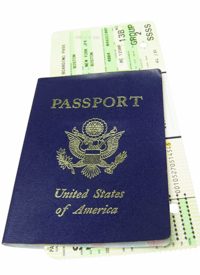
The U.S. government now requires a passport in order to travel to Mexico or Canada. While such rules may seem a minor inconvenience, even such an arguably minor abridgment of the liberty of movement could become the first step of an incremental decline into increasing subjection.
While obtaining a passport is neither unusual nor particularly burdensome, there is a fee involved (and it increases annually), and every application must be approved by the State Department; typically one waits weeks to receive this essential document.
As the issuing agency, the State Department is responsible for promulgating the appropriate rules for obtaining a passport. Reportedly, that process might be changing soon.
A new “biographical questionnaire” has been proposed by the State Department. The data will be used in lieu of the current application. If enacted, the proposed new Form DS-5513 would mandate that all those seeking a passport supply the following vital data:
1. Names, birth places, and dates of birth of members of your extended family;
2. the name of your mother’s employer at the time of your birth;
3. whether or not your mother received pre- or post-natal medical attention;
4. the name and address of the health care provider that treated your mother before, during, and after your birth;
5. the address of every home you’ve lived in since birth;
6. and the name and address of every school you’ve attended since kindergarten;
7. and any “religious ceremony” performed at or around the time of your birth.
On the form, the State Department estimates that the average respondent would be able to compile all this information in just 45 minutes; however, analysts say that in light of the nomadic aspect of modern culture, it is unlikely that most people could provide such information even given time to gather it from a myriad of sources. The suggested new application, however, would punish those supplying any answers that are not “true and correct” with imprisonment. The following language is taken from the copy of the proposed application:
False statements made knowingly and willfully in passport applications or in affidavits or other supporting documents submitted therewith are punishable by fine and/or imprisonment under the provisions of 18 U.S.C. 1001 and/or 18 U.S.C. 1542. Alteration or mutilation of a U.S. passport is punishable by fine and/or imprisonment under the provisions of 18 U.S.C. 1543. The use of a U.S. passport in violation of the restrictions contained therein or of the passport regulations is punishable by fine and/or imprisonment under the provisions of 18 U.S.C. 1544. All statements and documents submitted are subject to verification. Failure to provide the information requested on this form may result in the denial of a United States passport, related documents, or service to the individual seeking such passport, documents, or service.
Moreover, as expected, the boilerplate language on the application itself requires the applicant to sign verifying that he is aware that any and all of the answers provided may be shared with all other departments and agencies of the federal government, including the Department of Homeland Security. Again, from the new application:
The information solicited on this form may be made available as a routine use to other government agencies and private contractors to assist the U.S. Department of State in adjudicating passport applications and requests for related services, and for law enforcement, fraud prevention, border security, counterterrorism, litigation activities, and administrative purposes. The information may be made available to foreign government agencies to fulfill passport control and immigration duties. The information may also be provided to foreign government agencies, international organizations and, in limited cases, private persons and organizations to investigate, prosecute, or otherwise address potential violations of law or to further the Secretary’s responsibility for the protection of U.S. citizens and non-citizen nationals abroad. The information may be made available to the Department of Homeland Security and private employers for employment verification purposes. For a more detailed listing of the routine uses to which this information may be put see the Department of State’s Prefatory Statement of Routine Uses relative to the Privacy Act (Public Notice 6290 of July 15, 2008) and the listing of routine users set forth in the System of Records Notices for Overseas Citizen Services Records (State-05) and Passport Records (State-26) published in the Federal Register.
The collection and storage of such critical and personal data would represent a major step down the path of establishing a robust surveillance database of private information that is on a level with that already managed by the government of the United Kingdom.
While the present passport application process might be considered irksome and unduly onerous, if the process is altered as proposed, then the requirement of providing such an enormous cache of personal data to the federal government would unquestionably represent a severe alienation of the right to travel freely.
Admittedly, not every applicant will be selected to fill out the new questionnaire, but as yet no determinative criteria have been published regarding the profiling process that will be implemented to designate which travelers must submit to the interrogatories.
What is clear, however, is that the new regulations endow passport examiners with an impressive panoply of power disquieting to those concerned with the unaccountability inherent in bureaucracy.
Furthermore, if this proposal is enacted as a regulation, it represents an open proclamation by the federal government that it intends to enforce upon penalty of law the accumulation of all manner of essential information about every one of its citizens.
One may refer to the supporting statement, statement of legal authorities, or regulatory assessment submitted by the State Department to the Office of Management and Budget (OMB), as well as the Federal Register notice.



